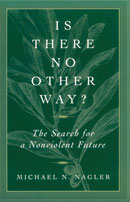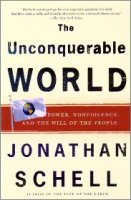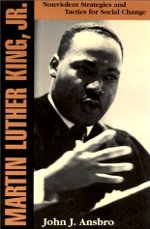The title was meant to be provocative.
Most of the pacifist literature of the time intended to build up pacifism as a logical conclusion from examining Christian scripture, showing it to follow necessarily from the teachings of Jesus and therefore to be obligatory, regardless of the consequences (which were, in any case, in God’s hands).
More practical and worldly-minded people, unconvinced, would respond by presenting scenarios in which war seemed the best answer, and pacifism a poor one, and would address the question from more of a utilitarian/consequentialist point of view.
And, in the United States, there was no better example scenario for this purpose than the American Revolution — the perfect example of a justified war for liberty and against tyranny.
Whipple took the bait.
What he came up with is the first example I know of that makes a detailed and sober case for mass civilian nonviolent resistance as an alternative to war, an alternative that is not only effective but that promises greater gains for fewer costs than the violent alternative.
Nowadays, there are think tanks and even Pentagon working groups devoted to large-scale civilian nonviolent resistance, and researchers have devoted hours to delving into historical examples and testing theories.
Whipple had to rely on faith and imagination, but what he came up with, with few changes, could be issued a century later by Gandhi or today by Gene Sharp’s crew.
What, all war wrong?
Yes, says the Peace man.
Then the war which gained American Independence, our glorious Revolutionary war, was wrong!
It was.
Then, sir, tell me this, if you can.
Where would our great, prosperous, and happy country have been at this moment, but for that war?
I will tell you.
It would have been more prosperous, more moral, and happier than it now is.
You cannot surely believe such an absurdity.
Wonderfully prosperous and happy we should be, no doubt, remaining to this hour under the tyranny of Great Britain
There is your mistake, my friend.
You take it for granted, without examination, that we could never have freed ourselves from British domination, except by war.
Now, I say, that we should have attained independence as effectually, as speedily, as honorably, and under very much more favorable circumstances, if we had not resorted to arms.
Very well: now show me how it could have been done.
Our fathers might have accomplished this object, great as it was, merely by taking the course which the society of Friends took to maintain their rights, and by which, though a small and despised body of men, they compelled the English and American governments to recognize and protect those rights.
This course consisted of three things.
1st. A steady and quiet refusal to comply with unjust requisitions; 2d. Public declarations of their grievances, and demands for redress; and 3d. Patient endurance of whatever violence was used to compel their submission.
We have every reason to expect that steady perseverance in a course like this will ultimately succeed, wherever the cause is just.
Because “moral might is always on the side of right;” and because governments are composed of men, and not of brutes.
Let us suppose, for a moment, that our fathers had acted in the manner I have mentioned, and see what the various stages of the process would have been.
In every part of the contest, they strictly adhere to the principles above stated.
They carefully refrain from violence, constantly remonstrate against the oppressive acts, and persevere in passive resistance.
— When the taxed tea is brought to their shores, they universally abstain from the use of it.
It lies undemanded in the ware-houses, and thus the plan of taxation, as far as that article goes, is as completely defeated as it could have been by violence and robbery.
When the stamped paper is taxed, they carry on their business without it.
This involves great difficulty, inconvenience, and embarrassment of business.
No matter!
They are patriots, and willing to suffer for their country; and the evils thus endured are infinitely less than the calamities of war.
If direct taxes are laid upon them, they quietly, but universally, refuse payment.
Their property is seized and sold to raise the tax.
They patiently submit to this evil, for their country’s sake, and rejoice that it is so slight in comparison with war.
Imprisonment, insult, and abuse of every kind, are added to enforce the oppressive acts of parliament.
Still no violence is used, either for defence or retaliation; but petitions, remonstrances, delegations are multiplied as the occasions for them recur.
When all these measures are found to fail of success, they unite in solemn assembly to make to the world a declaration of their wrongs, and pronounce their formal separation from, and independence of the British nation.
This movement excites new and more violent demonstrations of hostility on the part of the British functionaries.
The signers of the Declaration of Independence, and the officers of the new government, are seized and sent to England to take their trial for high treason.
No opposition is made, no defence attempted by the patriot leaders.
They are ready to lay down their lives in support of the liberty of their country, and they rejoice to meet the danger in this form, in which they can explain and defend their principles, rather than to submit their cause to the decision of brute force on the battle-field, where their own fall would involve the destruction of thousands of their countrymen.
They are tried by the constituted authorities of England, and calmly avow and defend their revolutionary measures.
They are found guilty, sentenced to death, and (for we will suppose the worst) actually executed as traitors.
But their defence, their bold and clear explanation of the principles of liberty, their new views of the relative rights and duties of a government and its subjects, are in the mean time eagerly read and pondered by all the British nation.
And while this good seed is taking root in the hearts of the people, the source of power, let us return to the United States, and see what the revolutionists, thus suddenly deprived of their leaders, are doing.
As soon as that noble band of pioneers is taken from them, they choose others to administer the affairs of the new nation.
These, too, are seized as rebels.
They immediately elect more.
What shall the colonial officers do against such pertinacious, yet unresisting opponents?
The whole population avow their determination to be flee.
The whole population offer themselves for punishment.
The prisons are filled to overflowing with rebels; yet they have accomplished nothing, for every man they meet is a rebel.
What is to be done?
Shall they send for an army?
That is needless, for their present force is unresisted.
But suppose an army comes.
They can do nothing but take prisoners and destroy property, and perhaps execute a few persons; for I take it for granted that they would not attempt to put to death the great mass of the population.
All that they do to enforce obedience renders them more odious to the people, and nothing is effected towards destroying the principles of liberty.
Intelligence arrives of the death of their leaders in England.
This adds fuel to the fire.
Their determination, before strong, is now irrevocable.
On the other hand, the news of their measures, their pertinacity, and their non-resistance, is constantly going to the people of England, a people already moved to sympathy by the constancy and heroism of the patriot leaders, and already half persuaded by the arguments of those leaders that their cause is just.
Can it be imagined, is it consistent with the attributes of human nature to suppose, that such a persevering and undaunted defence of principles so just would fail of working conviction in the hearts of a people like the English?
Even were it possible for parliament to persevere in the attempt to subjugate such opponents by force, the whole English people, the whole civilized world, indeed, would cry out shame upon them, and force them to abandon the design, and finally to recognize the independence of the Americans.
It follows as a necessary inference from the principles before alluded to, namely, that moral might is altvays on the side of justice, and that governors and legislators are never destitute of the feelings and sympathies of men, that firm perseverance in such a course as I have described must have resulted in the acknowledgment of American Independence; and probably that result would have occurred in much less time than was occupied by the revolutionary war.
This will be made perfectly clear by looking, for a moment, at the reason why Great Britain at last gave up the contest.
Did we conquer that mighty nation?
Not at all!
Still less did they conquer us!
Why, then, did not the war continue?
Simply and solely because Great Britain was tired of fighting! absolutely wearied out by contention and its necessary consequences!
Would not a similar pertinacity in time produce the same effect without the use of physical force?
I say, we should certainly in this way have attained our Independence.
We will now suppose this object effected.
Let us see what evils the pacific course has produced, in comparison with the evils actually resulting from the revolutionary war.
1st. Loss of Life. We will make a liberal estimate, and allow that one thousand persons have been executed as traitors, after deliberate trial and sentence; and that ten thousand (men, women, and children) have been slain, unresisting, by the exasperated British soldiers.
Upon this enormously exaggerated supposition we have eleven thousand lives lost.
But it is computed that a hundred thousand Americans perished during the eight years of the revolutionary war.
We have, then, a direct saving of eighty-nine thousand lives of American citizens by pacific measures.
This alone should decide the question in favor of peace.
But we have other considerations.
2d. Expense direct and indirect. Commerce, trade, and manufactures have been to a great extent suspended, and a large amount of property has been wantonly destroyed by the devastations of the enemy.
But all this would have happened to a still greater extent in war; and the non-resisting policy has saved us the enormous expense of supporting an army and navy, and of building and equipping fortifications.
The direct expense of the revolutionary war to our country is estimated, by Pitkin, at $135,000,000. The same author has stated the direct expense of our military operations since that war, to be more than $300,000,000. All this at least, $435,000,000, we should have saved by the pacific policy.
3d. The interests of morality and religion.
If a whole people have such a sense of their duty to God as to refuse to protect themselves by means which he has forbidden, they will not be likely to neglect either to recognize his hand, or implore his protection, throughout the struggle.
The Sabbath has been strictly observed, and the supplications of the nation have arisen more ardently than ever to Him who holds the hearts of kings in his hand.
The mass of the people, having their minds intently fixed on the great struggle between liberty and oppression, and anxiously watching the contest of faith, love, patience and hope, against carnal weapons, have been strongly withheld both from trifling amusements and vicious indulgences.
At the close of the struggle, therefore, the interests of religion and morality are more flourishing than at its commencement.
But, on the other hand, look at the long train of moral evils which crowd in the track of our revolutionary war.
Intemperance, which has now become so extensively the disgrace of our land, unquestionably had its origin in the daily rations of spirit served to the revolutionary army and navy.
Sabbath-breaking was abhorred by the descendants of the pious pilgrims, until war, which knows no Sabbath, broke over the appropriate employments of that day, and the reverence due to it.
Licentiousness, the proverbial inmate of every camp, and profaneness, a vice almost universal among soldiers, have fearfully increased since their toleration in the revolutionary army and navy.
Then the whole spirit and practice of war produce a slight estimation of the value of human life.
Habits of plunder destroy that regard which we naturally feel for the sacredness of private property.
The absolute and unconditional obedience demanded by military superiors, takes away the sense of individual responsibility to God.
In short, war is permitted to suspend all the rules of morality.
The loss of $400,000,000, and even the destruction of 100,000 lives, appear but trifling evils, in comparison with the enormous deprivation of moral habits and religious principles which the revolutionary war has produced in this nation.
The considerations above mentioned entirely satisfy me not only that we should have gained our independence, but that we should have been more prosperous, better and happier than we now are, had there been no revolutionary war.
So much for positive results of the non-resistance plan.
It may now be well to look at the subject in another aspect, and see what results would not have taken place, had our ancestors been magnanimous enough, honorable enough, Christian enough, to refuse to fight with Great Britain.
Having gained their independence in the mode above mentioned, most assuredly they would not have continued to hold their fellow-creatures in slavery.
Upon this point we cannot be mistaken.
Men who had been led by Christian principle to regard the rights and abstain from the destruction of their enernies, could not have deliberately pursued a system of oppression and fraud against their former fellow-sufferers.
Men who had so strongly demonstrated their belief in the doctrine, that the whole human race are alike entitled to life, liberty, and the pursuit of happiness, could not have systematically manufactured and used whips, chains, handcuffs and branding-irons.
They would not have kept back the hire of the laborer; they would not have taken away the key of knowledge; they would neither have denied the theory nor shrunk from the practice of immediate emancipation.
They would certainly have been, in truth as well as in pretense, a free people.
Again.
They would not have proceeded to defraud, corrupt, and exterminate the original inhabitants of this country.
They would neither have deprived the Indians of their lands, nor supplied them with liquid fire, nor broken their faith, plighted in solemn treaties, nor expended the revenues of the country in making war upon them.
How much treasure, how much blood, how many precious lives, how many immortal souls, might they have saved
Lastly.
They would not have admitted the system of violence and retaliation as a constituent part of their own government.
Having forgiven their foreign foes, they would have pursued the like Christian course towards every domestic enemy.
Having conquered by suffering in the great contest between nations, they would have trusted to the same means for overcoming all minor evils.
So far from depending on the gallows, the prison, the stocks, the whipping-post, for peace and quietness, they would utterly have rejected all such barbarous instruments, and substituted for them love, joy, peace, long-suffering, gentleness, goodness, faith, hope, patience, meekness.
And, doing thus, they would have found the word of God a sure reliance; the whole armor of God a safe protection.




